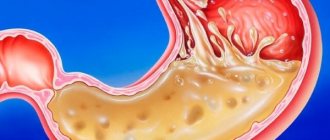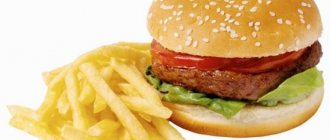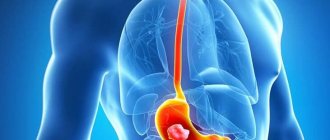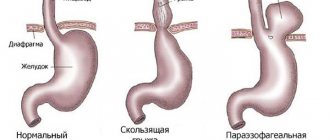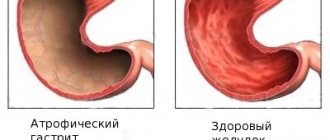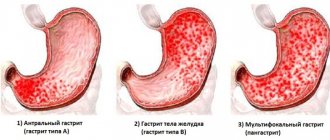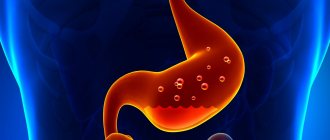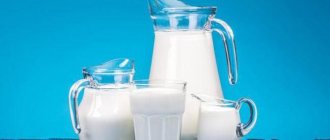General concepts and reasons
The most common cause of increased stomach acidity is a nutritional factor, i.e., improper, irrational nutrition.
Spicy, salty, fatty foods, and alcoholic drinks have an irritating effect on the gastric mucosa, as a result of which the parietal cells begin to secrete hydrochloric acid in greater quantities than required. The nutritional factor also includes too rapid absorption of food. In this case, a poorly chewed bolus of food enters the stomach, not sufficiently moistened with saliva, containing too large particles. To digest it, a larger amount of gastric juice is required, and therefore hydrochloric acid, which leads to increased acid production, and therefore to an increase in the acidity of gastric juice.
The most common cause of high stomach acidity is poor diet.
Other causes of increased stomach acidity may include:
- Long-term use of non-steroidal anti-inflammatory drugs and/or corticosteroids, as they have an irritating effect on the gastric mucosa.
- Chronic stress. In itself, it does not have a negative effect on the state of the digestive system, however, being in a depressed state, a person stops eating properly, often smokes, drinks alcohol, which negatively affects the gastric mucosa.
- Smoking. Nicotine has a stimulating effect on parietal cells, resulting in an increase in stomach acidity.
- Infection with the bacterium Helicobacter pylori. This is a unique microorganism that can survive in an acidic environment. Once in the stomach, bacteria produce urease, which has an irritating effect on its walls. In an effort to destroy these bacteria, stomach cells intensively synthesize hydrochloric acid and pepsin.
A significant decrease in the acidity of gastric juice is characteristic of many diseases of the digestive system.
Gastric juice is considered an integral part of digestion. It is produced from cells in the stomach lining. It contains several elements, the main one of which is hydrochloric acid.
What is she responsible for:
- participation in digestion;
- fight against various microorganisms and bacteria that have entered the stomach.
When the acidity of the stomach is low, a person begins to have problems with digestion, since food is not completely digested, but begins to rot, bringing pain to the patient. And the toxins that are released when food rots cause intoxication of the body, resulting in nausea and vomiting in the patient.
Signs of low stomach acidity in the first stages appear slightly. For starters, it might just be bad breath. Low acidity prevents the body from fighting harmful microorganisms in the stomach, as a result of which a person may develop peptic ulcers or other diseases of the digestive system.
Causes of diseases:
- disruption of the gastric mucosa;
- gastric motility problems;
- various changes in the mucous membrane.
These reasons can appear due to both external and internal factors.
How external factors influence the state of the digestive system:
- Poor nutrition – if a person has chosen the wrong diet for himself, is undernourished for various reasons or, conversely, overeats.
- Alcohol abuse – the ethanol contained in alcohol reduces the acidity of gastric juice.
- Long-term use of medications - antibiotics and analgesics can reduce acidity. Giving up medications is not always an effective method of solving the problem, since sometimes they are replaced with herbal teas or infusions. Green tea contains some herbs that can also reduce stomach acid.
- Parasites – any parasites in the stomach affect acid levels and can also cause various diseases.
- Constant stress and nervousness can have a detrimental effect not only on the nervous system, but also on gastric motility.
Internal factors:
- the reasons are genetic predisposition;
- reflux esophagitis;
- weakening of the immune system;
- problems of the body's endocrine system.
Diet for high acidity
A person suffering from excessive secretion of hydrochloric acid needs to monitor what food he eats. Only with the help of diet can you easily reduce stomach acidity. Products must be fresh, without added preservatives or seasonings. The basis of nutrition should be cereals and liquid
which envelop the gastric mucosa and protect it. It is best to cook rice, oatmeal or semolina for this. Milk is beneficial as it reduces acidity well. You can also eat cheese, low-fat cottage cheese and yogurt.
Include more boiled or stewed vegetables in your diet, preferably potatoes, cauliflower and carrots. You shouldn’t give up fruit either, just choose non-acidic ones. It’s good to make puree, mousse or jelly from them. You need to choose lean meat, preferably chicken, veal or rabbit. It needs to be boiled, stewed or baked, for example, to cook meatballs or steam cutlets.
It is recommended to eat the bread slightly dried. You can eat soft-boiled eggs or scrambled eggs, drink weak tea or still mineral water. This diet will help you reduce stomach acidity. Foods that lead to increased production of hydrochloric acid should be excluded from your diet, but otherwise, in the absence of symptoms of the disease, you can eat more variedly.
Symptoms
Clinical manifestations of increased gastric acidity usually differ little, given the reasons for its increase. So, the following are the main symptoms of high stomach acidity:
- Heartburn. A mandatory sign of a change in acid level is heartburn. This clinical manifestation is not critical, but it causes a lot of discomfort. Considering the root cause of its occurrence, heartburn can occur immediately after eating or after some time. The appearance of regular attacks of heartburn is a sign that it is associated with an existing disease, and not with errors in the diet. Under such circumstances, it will be easiest to reduce stomach acidity at home.
- Pain in the left epigastric region. Excessive amounts of hydrochloric acid have a traumatic effect on the walls of the stomach, which leads to pain. How severe the pain is depends on the etiological factor. So, with gastritis, the pain will be moderate, and with a peptic ulcer, it will be significant. Sometimes, pain may require the use of analgesics.
- Dyspeptic disorders. A change in the normal digestive process results in a number of changes in the digestive system, such as diarrhea, nausea or vomiting. The latter may appear regardless of food intake. This is due to the fact that due to the inflammatory process, the stomach receptors are constantly irritated, perceiving an empty stomach as full. The appearance of such symptoms can also occur during the use of drugs that reduce gastric acidity, due to their side effects.
- Deterioration in general health. If the hyperacid state is caused by a disease, then a general reaction of the body may occur, in the form of an increase in body temperature to low-grade levels, decreased appetite, and general malaise.
Before choosing a way to get rid of high stomach acidity, you need to consult a doctor to determine the cause of this condition.
Low acidity in the stomach and its symptoms are similar to other diseases of the digestive system. Main symptoms:
- after eating a person begins to experience stomach pain;
- belching and bad breath;
- the onset of heartburn;
- flatulence, hiccups;
- stomach upset.
If a patient experiences such signs, it is better to consult a doctor. Only he can correctly diagnose and prescribe treatment. If the acidity has decreased and the patient is diagnosed with diseases of the digestive system, high-quality treatment is necessary. If the disease is prolonged, serious consequences may develop.
People with low acidity most often experience signs of anemia:
- problems with hair begin, they become dull and dry;
- the skin becomes dry;
- nails become brittle and peel;
- There may be a rash or acne on the skin.
If a person does not monitor his health and is not treated, this can lead to the following consequences:
- Hemoglobin in the blood becomes lower, which leads to a general loss of strength.
- Skin hypoxia (lack of oxygen in the skin) may occur.
https://www.youtube.com/watch?v=rK_mEAHpp08
As a result of these problems, a person may experience health problems, as well as nervous disorders.
Symptoms of low acidity do not appear immediately. But, nevertheless, if they begin to appear, you should immediately pay attention to this and consult a doctor.
The main symptoms of increased stomach acidity are epigastric pain and heartburn. The pain is nagging, aching and dull in nature, in most cases it occurs 1.5-2 hours after eating. Heartburn develops as a result of gastric juice entering the esophagus. Often its appearance is provoked by eating foods that increase stomach acidity:
- orange or tomato juice;
- spicy and/or fatty foods;
- smoked meats;
- some types of mineral water.
Heartburn is the main symptom of high stomach acidity.
Other symptoms of high stomach acidity are:
- nausea, and in some cases vomiting, occurring 15-20 minutes after eating;
- belching sour;
- constipation;
- flatulence;
- frequent intestinal colic;
- the appearance of a white-gray coating on the tongue.
Components of gastric juice
Let's consider how the components of gastric juice change during hypoacid and hyperacid gastritis.
| State | pH | Acidity | |
| Total HCl | Free HCl | ||
| Norm | 1,5-2,5 | 40-60 | 20-40 |
| Hypoacid gastritis | about 1.0 | > 60 | > 40 |
| Hypracidal gastritis | > 2,5 | < 40 | < 20 |
As can be seen from the table, increased acidity is characterized by a low pH value, and decreased acidity is characterized by a high pH.
https://youtu.be/7jeq9-PX0io
Diagnostics
To determine the acidity of gastric juice in clinical practice, the following methods are used:
- Intragastric pH-metry. Using a special device, the acidity of the stomach is determined in its various parts. The method allows for both short-term and daily pH measurements.
- Fractional intubation of the stomach. The procedure is performed on an empty stomach. A thick probe is inserted into the patient's stomach through the mouth, and then the gastric contents are sucked out using a Janet syringe at certain intervals. This technique allows you to evaluate the characteristics of the secretory function of the stomach, as well as carry out a laboratory study of gastric juice with determination of its pH. However, fractional intubation cannot provide accurate results, since gastric juice is mixed from different zones, and in addition, the probe itself irritates the gastric mucosa. Normally, the content of hydrochloric acid in gastric juice should be 0.4–0.5%.
- Gastrotest, or acidotest. Before the study begins, the patient completely empties the bladder, after which he takes special medications orally. After a certain period of time, the patient urinates again and the acidity of the gastric juice is assessed based on the degree of staining of the urine. The method is imperfect, so it is rarely used today.
Intraventricular pH testing helps determine stomach acidity
You can detect increased acidity of gastric juice at home. To do this, you should drink a glass of freshly squeezed apple juice on an empty stomach, which does not contain any additives. If after some time a burning sensation appears behind the sternum, a feeling of heaviness or pain in the epigastric region, then the acidity is most likely increased.
Danger
With reduced acidity in the patient’s body, the overall balance of the internal organs is disrupted. Symptoms usually indicate the presence of a serious illness. But even if it was caused by itself, it is already dangerous for the patient.
Why is low acidity dangerous?
- Hydrochloric acid is responsible for important functions in the digestive process, so if it is produced in less volume, negative consequences appear.
- Acid is responsible for the active digestion of food in the stomach. If it is less than required, food products are not digested, but begin to ferment, which brings unpleasant sensations to the person.
- If food is not completely digested, it can lead to intoxication of the body. And this, in turn, leads to a decrease in the immune system, as well as various serious diseases.
People with low acidity must undergo a course of treatment. But in order to choose the right medications, you need to study the causes of the disease.
Increased acidity and psychosomatics
There is a method to increase low acidity without medications or folk remedies. To do this, you need to change your psychological type. The portrait of people suffering from high acidity is the same in almost all cases. This is an overworked person who has taken on more than he can handle.
The degree of responsibility on him is much higher than the resources of his nervous system. As a result, a person becomes regularly in an aggressive state of mind. However, his anger is not aimed at others, but at himself. Such a person blames only himself for his failures.
This disease has become almost professional among dispatchers, pilots, and machinists responsible for safety at hazardous facilities. It's all about the responsibility they have. Therefore, such people carefully monitor their diet, since they cannot be indifferent to their work - people may die. So you have to work on the verge of gastritis.
In a situation where people’s lives do not depend on you, but the acidity of the stomach regularly increases, you need to learn to be calm. It is important to know that no task assigned by others is one hundred percent binding. If the requirements for completing a task are higher than the available forces, then you need to forget about it. Thus, you should discard all obligations that exceed the available resource, and leave only feasible tasks.
Treatment
Drug treatment of high gastric acidity is carried out with drugs from the following pharmacological groups:
- proton pump inhibitors (Omeprazole, Pantoprozole, Nolpaza) – reduce the secretion of hydrochloric acid by the parietal cells of the stomach by blocking H/K-ATPase;
- H2-histamine receptor blockers (Ranitidine, Cimetidine) – block histamine receptors, thereby reducing the secretion of hydrochloric acid and pepsin;
- antacids (Phosphalugel, Almagel, Rennie, Gastal) – neutralize hydrochloric acid in gastric juice, thereby eliminating heartburn, pain and discomfort;
- M1-cholinergic receptor blockers, which have a predominant effect on stomach receptors (Gastrocepin) - inhibit the secretion of pepsin and hydrochloric acid, have a gastroprotective effect;
- antibacterial drugs - therapy for helicobacteriosis.
In case of severe pain, antispasmodics (Papaverine, No-shpa), as well as local anesthetics orally (novocaine solution, tablets with anesthesin) are prescribed.
Omeprazole and other proton pump inhibitors help reduce acid secretion
Some patients take a solution of baking soda orally to eliminate symptoms of increased stomach acidity. Soda enters into a neutralization reaction with hydrochloric acid, as a result of which pain in the abdominal area and heartburn quickly disappear. But such treatment of increased stomach acidity subsequently leads to even greater secretion of hydrochloric acid by parietal cells.
As a result of a chemical reaction between baking soda and hydrochloric acid, table salt and carbonic acid are formed, which is an unstable chemical compound that easily breaks down into water and carbon dioxide. Carbon dioxide irritates the gastric mucosa, thereby causing increased secretion of hydrochloric acid. As a result, there is an even greater increase in stomach acidity. This phenomenon in medicine is called “acid rebound”.
In modern medicine, there are many methods to determine the level of acidity in the stomach. Treatment consists of several stages:
- taking medications;
- diet.
After studying the research results, the doctor should prescribe treatment that will be aimed at eliminating the following problems:
- restoration of the gastric mucosa;
- normalization of digestion;
- treatment with antibacterial agents.
Quite often, in order to increase the acidity of gastric juice, a specialist prescribes a number of drugs:
- Enveloping agents – protect the gastric mucosa, these include Almagel.
- Antibacterial agents – fight the causes of disease.
- Stimulant medications – help improve the production of hydrochloric acid.
- Substitute drugs are prescribed only if the initial treatment has not produced results.
- Restorative agents – help normalize gastric juice.
- Vitamins – help keep the immune system in order.
In this case, the following are assigned:
- antibiotics – Amoxicillin;
- proton pump inhibitors – Omeprazole;
- bismuthate subcitate – De-Nol.
Medicines that increase acidity cannot be selected independently; you must consult a doctor before use. There are few medications that combat low acidity. However, only a doctor will be able to select the dosage based on the examination results.
The main task of the entire treatment is to select drugs so that the amount of enzymes in the stomach reaches the required level and digestion begins to work stably.
It is better to take Omez at times when the patient is suspected of having an infectious disease. Almagel envelops the walls of the stomach and protects the mucous membrane.
It is better to take De-Nol half an hour before meals; this medicine is prescribed for the treatment of gastritis and other diseases.
De-Nol has protective and anti-inflammatory properties. A positive effect on the source of infection was noticed by both patients and doctors. The drug, dissolving in gastric juice, envelops the walls of the stomach, thereby protecting it from pathogenic bacteria.
When a doctor prescribes De-Nol:
- for digestive problems;
- for stomach pain;
- in the treatment of gastritis.
De-Nol not only has protective and anti-inflammatory effects, but also helps in the regeneration of gastric tissue.
In addition to the medication method, doctors recommend following a diet. It should be started simultaneously with taking medications.
To increase the production of hydrochloric acid, you need to avoid foods (fermentations) that contain protein:
- dairy products;
- yogurt;
- sour cream;
- fruits.
If you are interested in how to increase stomach acidity at home, you must adhere to the established rules:
- 30 minutes before meals, drink a glass of mineral water that does not contain gas;
- When eating food, it must be chewed thoroughly;
- refuse excessively hot dishes;
- eat only food that was prepared not long ago.
For stomach diseases, treatment that increases acidity is necessary. When choosing a diet, the doctor must look at the general state of health and the clinical picture of the disease.
Diet to increase acidity:
- First courses are recommended from grated vegetables.
- Prepare dishes from dietary meat.
- Eat more fish.
- You can eat some types of cheese.
- Eggs, only soft-boiled, or an omelet.
- Eat porridge only in semi-liquid form.
- Fruits should be consumed after special processing.
As your health improves, you can add some foods to your diet:
- liquid fermented milk products;
- fruit juices;
- fresh fruits, which can increase acidity;
- fresh vegetables;
- coffee, just a little.
To increase acidity, you need to add foods that contain vitamins to your food. You should take honey and currants and lingonberries.
Folk remedies
Mix 4 tablespoons of wormwood herb with one spoon of yarrow. Brew in half a liter of hot water. Let it brew for about 30 minutes, drink one spoon before eating.
To improve gastric motility, it is recommended to take currant juice. Every day, at least three times a day before meals, you should drink a quarter glass of prepared juice.
Quite often, gastroenterologists prescribe the drug Cedar resin to treat their patients.
It is able to restore normal microflora in the intestines, stimulates the functioning of the digestive organs, and also heals the mucous membrane. Cedar resin is very popular because of its properties.
Another good remedy for treating diseases of the digestive system is chaga. Kombucha is only part of the treatment for stomach diseases, and when using it, you should definitely consult a doctor.
Chaga has properties such as antimicrobial, anti-inflammatory, antispasmodic, and treats many diseases.
For diseases of the digestive system, chaga creates a protective film on the gastric mucosa, which normalizes acidity.
Often patients prefer to drink the herbal drink “Chaga”; it replaces regular tea. Chaga can also be prescribed by a doctor in the form of infusions and capsules. The dosage for the drugs must be indicated by the doctor.
All tinctures and decoctions are recommended for patients to take instead of tea and coffee during the day. But only after consulting a doctor, since some herbs are not recommended to be taken with a number of medications.
Many people are interested in whether it is possible to drink soda to get rid of heartburn. Doctors do not recommend doing this, since soda and acid in the stomach can provoke a reaction and harm the mucous membrane.
Low acidity in the stomach, symptoms and treatment with folk remedies are individual for each patient. In order for the therapy to be of high quality and give the desired result, it is necessary to diagnose the cause of the disease that caused the illness.
Increasing the acidity of gastric juice is a slow process and requires high-quality treatment.
For those patients whose problem is caused by the consumption of certain foods, there is no need to take tablets for high stomach acidity. It will be enough for them to balance their diet and adhere to some restrictions. To improve your well-being, you can take folk remedies that reduce the acidity of gastric juice.
In order to prevent the appearance of unpleasant symptoms due to increased stomach acidity, for many people it is enough to eliminate or significantly limit a number of foods and drinks. Among them are:
- Fresh vegetables and fruits.
- Pickles.
- Spices.
- Smoked and fried foods.
- Sour juices and fruit drinks.
- Fermented milk products.
- Alcohol.
- Carbonated drinks.
Following these recommendations allows you to restore the normal digestion process and eliminate the amount of free acid. Even in the early stages of gastritis, the disease can be completely eliminated without the use of medications.
It is worth noting the fact that with the help of some folk remedies you can effectively reduce acidity, while they are completely safe. One such remedy is milk. It has an alkaline environment, which quickly neutralizes excess acid.
There is no better way to reduce stomach acidity at home than drinking baking soda. Sodium bicarbonate powder is present in every housewife's kitchen. It can be taken orally as an aqueous solution or a dry substance.
Gastroptosis
What is gastroptosis? The answer to this question worries some people who have been diagnosed with this disease by a doctor.
Gastroptosis is prolapse of the stomach. It can be either congenital or acquired.
The causes of congenital pathology are the characteristics of the human body. Acquired gastroptosis appears for various reasons, it can be rapid weight loss, removal of malignant tumors in the stomach, and much more.
Manifestations of the disease are acute pain in the abdominal area after eating. Only timely consultation with a doctor and correct diagnosis can help the patient cure the disease.
The human digestive system has many features. You need to listen to your body and if alarming symptoms appear, contact a gastroenterologist. Due to reduced or increased levels of acid in the gastric juice, a person may experience unpleasant consequences.
Prevention
Prevention of the development of high stomach acidity should be based, first of all, on the organization of proper, balanced nutrition:
- eating small portions of food;
- chewing food thoroughly;
- inclusion in the diet of foods rich in plant fibers, vitamins, microelements, and protein;
- limiting fatty and spicy foods;
- refusal to eat fast food, snacks, so-called junk food;
- giving up alcoholic beverages and smoking.
Equally important in the prevention of high stomach acidity is the correct lifestyle:
- avoidance of stressful situations;
- regular exercise;
- compliance with the optimal work and rest regime.
It is also necessary to promptly treat infectious diseases, since they can lead to disruption of the secretory activity of cells in the gastric mucosa.
How to reduce stomach acidity quickly
The most common way to do this is to drink a glass of water with a teaspoon of soda dissolved in it. This solution quickly neutralizes the acid. An excellent remedy is chalk powder or white clay. You need to mix it in water and drink this suspension twice a day before meals. You can also eat chalk powder this way. Honey water helps reduce acidity. Dissolve a spoonful of honey in a glass of warm water and drink.
Common foods will also come to your aid: carrots and potatoes. The juice from these vegetables is very good for the stomach. But if carrot can be taken without restrictions, then potato is drunk a quarter glass 3-4 times a day. Include pumpkin and red beets in any form in your diet more often. It is best to boil or bake them.
Sea buckthorn is a very effective remedy against high stomach acidity. It is good to make a decoction of the berries and drink it with honey; taking sea buckthorn oil is also useful. Don't forget about mineral water. But to reduce acidity, you need to drink alkaline water without gas before meals.

